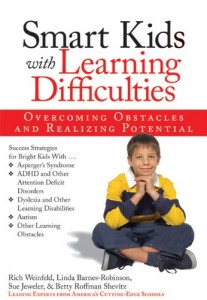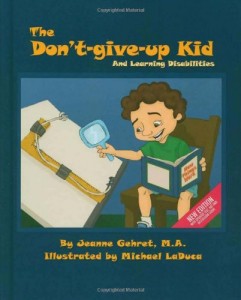 In addition to classroom challenges, one of the challenges facing students with learning disabilities or challenges is learning to curtail extreme thinking patterns. Child Psychologist, Dr Thomas Achenbach has used the term “Externalizer” to refer to children who anger easily, deny or lie about their wrongdoing, blame others for their problems, or minimize the seriousness of what they did. Hence, Externalizer refers to the child’s tendency to externalize the blame for their problems, as opposed to accepting responsibility for them. Interestingly, these children appear to have no difficulty accepting responsibility for the good things they do. So, if they do a good deed, they deserve credit, to their way of thinking. On the rare occasions that they will admit they did a bad deed, they will either blame someone else for having “caused” them to do the bad deed, or to be caught doing the bad deed.
In addition to classroom challenges, one of the challenges facing students with learning disabilities or challenges is learning to curtail extreme thinking patterns. Child Psychologist, Dr Thomas Achenbach has used the term “Externalizer” to refer to children who anger easily, deny or lie about their wrongdoing, blame others for their problems, or minimize the seriousness of what they did. Hence, Externalizer refers to the child’s tendency to externalize the blame for their problems, as opposed to accepting responsibility for them. Interestingly, these children appear to have no difficulty accepting responsibility for the good things they do. So, if they do a good deed, they deserve credit, to their way of thinking. On the rare occasions that they will admit they did a bad deed, they will either blame someone else for having “caused” them to do the bad deed, or to be caught doing the bad deed.
On the surface, it would appear that the Externalizer pattern would lead to an inflated sense of self- esteem. If someone feels good about themselves for the good things they do, and they do not appear to be aware of ever doing anything bad, then they must feel pretty good about themselves. Right?
Wrong. The self-esteem movement of the 1990’s failed miserably with this crowd. It failed to appreciate the fact that Externalizers have difficulty delaying gratification. They, to borrow a familiar phrase, want what they want when they want it, and they get extremely angry, impulsive, and irrational when they do not immediately get what they want.
As a result of this anger and impulsivity, Externalizers often tantrum, break things, or say things that place them in an unfavorable light with others. It is very hard for an Externalizer to control their anger, and they need a great deal of anger management work to develop into an adult who can tolerate setbacks, assess the proper course of action, and implement that course of action in order to address the problem and fix it. They tend to just get mad and scream until someone else, usually a parent, teacher, or other caretaker, remedies the problem.
This pattern of allowing caretakers to fix the problem often results in the Externalizer’s appearing very immature and unprepared for the adult world. Therefore, your job as a parent, therapist, or other caretaker is to help the Externalizer grow in understanding of how to delay gratification, how to see their wrongdoing, and how to control their anger and blaming others for problems that they have largely brought upon themselves.
You often have to teach an Externalizer how to analyze the steps that occurred prior to a problem happening. For example, the student who gets an F and says it is because “the teacher hates me” needs to be taught that her not attending class, failing to complete homework, or doing poorly on tests might actually have something to do with the grade—or the teacher’s feelings about her, if the statement about the teacher hating her is valid.
In short, Externalizers need to learn to profit from the past and plan for the future. They have little or no trouble living in the here-and-now. They need to learn specific skills for relaxation, managing their anger and impulses, and developing appreciation for the feelings or perceptions of others.
On the other hand, there are children who are the mirror opposite of Externalizers. These children have difficulty learning to accept the credit for the good things they do, but they are extremely good at accepting responsibility or blaming themselves for the bad things that happen to them. Since they accept too much responsibility for the bad things that happen, Achenbach calls this type of children “Internalizers.”
One quick way to make a diagnosis of Internalizer versus Externalizer is to give the child a compliment. If you say, “You are really smart, Jimmy,” and he says, “Thanks,” “I know,” or “Everybody says that,” then he is probably an Externalizer—or an Internalizer who has been in treatment!
If you say, “You are really smart, Jimmy,” and he says, “No, I’m not,” “You’re just saying that because you’re my mom,” or “I’m not as smart as my friend Johnny,” then he is probably an Internalizer.
Internalizers do not get into the types of behavioral difficulties that plague Exteranlizers, but they do have problems of their own. Many internalizers are bullied or taken advantage of by their peers. Many internalizers have low self-esteem because they only see the bad things they do.
In fact, when an Internalizer does something well, they will generally give someone else credit for the good deed, mirroring how Externalizers blame others for their bad deeds. Internalizers thus need to learn to take credit for the good things they do, and this can begin by practicing the appropriate response to a compliment from you.
For example, make sure that they understand what a compliment is. A compliment is when someone says something nice about you or tells you that you did well on something. Tell them the appropriate response to a compliment is to smile and say “Thank you.” Then practice this in the safety of your home.
Many parents are amazed at their child’s inability to say “Thank you” without adding an apologetic or explanatory comment. For example, “Thanks, Mom, but that ‘A’ wasn’t a big deal. It was a really easy test, and nearly everybody made an A.”
Imagine a peer’s complimenting your daughter on the good grade she made on a recent test. Your daughter says, “Thanks, but it was an easy test,” and the other girl happened to make an F on the test. In her effort to be modest, your daughter has, for all intents and purposes, called the other girl “stupid.” The other girl may then get mad at your daughter, and your daughter has no idea why the girl is mad at her, or does not seem to like her.
In fact, Internalizers often fail to see why other children would ever be mad at them. They are, after all, the peacekeeprs. I often joke that, if there are only two pieces of candy for three people, the Internalizer will say, “You guys take the candy. I can get one later.” This is because Internalizers are mellow kids who do not like conflict. (A true Externalizer would figure out some way to get both pieces of the candy!)
The good news is that most of us learn to take these extreme patterns of interacting with the world, Externalizing and Internalizing, and moderate them in order to get our needs met while respecting the needs and rights of others. Externalizers need to see that the past and future are important, and Internalizers learn that living in the here-and-now can be a good thing.
Achenbach has written extensively on the above subject, and I highly recommend his books and other works. I would also like to recommend my book, Problem Children: It’s Not Always the Parents’ Fault, in which I have outlined several strategies for recognizing these patterns and teaching coping strategies to deal with them.
Parent Tool Box
Learning Challenges in Attention and Mood Problems
Learning Disabilities and Extreme Patterns of Responding to Others





